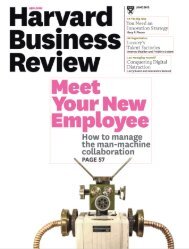+ + +
Create successful ePaper yourself
Turn your PDF publications into a flip-book with our unique Google optimized e-Paper software.
INNOVATORS<br />
LEADERSHIP<br />
ambiverted—did a really good job of<br />
empowering their most proactive people.<br />
The extroverts always wanted to set the<br />
direction, and they were really good at<br />
inspiring dutiful followers, but they made<br />
the mistake of shutting down the ideas<br />
of the people around them because they<br />
always wanted to be the center of attention.<br />
The ambiverts were much better at<br />
toggling back and forth between leading<br />
and following, and initiating ideas and<br />
reacting to them.”<br />
That innate ability to adapt is what<br />
sets ambiverts apart from extroverts and<br />
introverts, who are unwilling or unable to<br />
make the same behavioral adjustments,<br />
says psychologist Brian Little, senior<br />
fellow at The Wharton School and author<br />
of the 2014 book Me, Myself and Us: The<br />
Science of Personality and the Art of<br />
Well-Being.<br />
“If we accept the premise that management<br />
and entrepreneurial leadership<br />
require adaptive flexibility to engage in<br />
both introverted and extroverted tasks,<br />
which I believe they do, then we can see<br />
that those in the middle have more of<br />
that adaptive flexibility than those at the<br />
extremes,” Little says. “A person who can<br />
act out of character, who can adopt either<br />
the extroverted style or the introverted<br />
style, is the prototype of the great leader.”<br />
But that flexibility comes at a substantial<br />
cost. “Protractedly acting out<br />
of character is going to cause emotional<br />
and physical decline—the summary word<br />
would be ‘burnout,’” Little explains.<br />
“I talk in my work about how an introvert<br />
who has to engage in extroverted activity<br />
as a leader can carry that out very<br />
effectively if they have some restorative<br />
niches to which they can repair in order<br />
to get their first nature nurtured for a<br />
while. It is plausible to argue that the<br />
more we act out of character, the easier<br />
it becomes, but there are limits to that,<br />
and we really need restoration when we<br />
engage in that behavior.”<br />
CORE STRENGTHS<br />
Ambiverts aren’t superior leaders by<br />
default, of course. Intangibles like<br />
confidence, conscientiousness and<br />
commitment are critical, regardless of<br />
personality type. But in cases where<br />
ambiverts, extroverts and introverts<br />
exhibit many of the same core strengths,<br />
ambiverts maintain a competitive advantage<br />
by virtue of the comparative absence<br />
of chinks in their armor.<br />
“If you are an ambivert, it’s much<br />
easier to be a successful entrepreneur<br />
alone. If you’re more of an introvert or<br />
more of an extrovert to either extreme,<br />
the odds are higher that you’re going to<br />
need a partner who complements you<br />
and who brings the strengths that you are<br />
less likely to have,” Grant says. “I always<br />
think of the Google example: Larry Page in<br />
particular is far more on the introverted<br />
side of the spectrum, and Eric Schmidt<br />
coming in as CEO as the company<br />
is growing was a pretty healthy<br />
complement. Or take Facebook: Mark<br />
Zuckerberg is far more introverted than<br />
Sheryl Sandberg.”<br />
However, Grant theorizes that some<br />
colleagues may find ambiverts too flexible<br />
and unpredictable for their own good,<br />
preferring to work alongside leaders with<br />
a clear-cut set of behaviors and perspectives.<br />
Ambivert leadership could even<br />
ring false or misleading to some employees,<br />
author Pink contends.<br />
“What gives ambiverts strength<br />
is the same thing that gives bilingual<br />
people strength—they can talk to and<br />
understand introverts in their organization,<br />
and they can talk to and understand<br />
extroverts in their organization,” Pink<br />
explains. “But one possible weakness is<br />
the perception of inauthenticity. If you<br />
[extend] the metaphor of bilingualism,<br />
it’s like, ‘Wait a minute—you speak<br />
Spanish with Fred, and you speak English<br />
with Mary? What’s your real language?’<br />
This idea that they’re adapting to each<br />
situation—that they’re quasi-chameleons—could<br />
be perceived as a weakness<br />
by some, although I think it’s a strength.”<br />
Grant also questions whether ambivert<br />
leadership is vital throughout the life<br />
THE RISE<br />
OF THE<br />
BETA CHIEF<br />
Nobody should<br />
be making all<br />
the decisions.<br />
One expert<br />
proposes that the<br />
most effective<br />
leaders<br />
demonstrate<br />
authority through<br />
collaboration.<br />
If you’ve sat through one<br />
staff meeting, you’ve sat<br />
through them all. You know<br />
the drill: The extroverts monopolize<br />
the dialogue, tuning<br />
out the input of others, while<br />
the introverts go to the opposite<br />
extreme, suppressing their<br />
own ideas in favor of allowing<br />
other voices to dominate the<br />
discourse. Then there are<br />
the ambiverts, who inhabit the<br />
sweet spot between the two<br />
sides, instinctively knowing<br />
when to speak up and when<br />
to shut up—an essential skill<br />
in today’s increasingly collaborative<br />
business world.<br />
That model is explored in<br />
Dana Ardi’s book The Fall of<br />
the Alphas: The New Beta<br />
Way to Connect, Collaborate,<br />
Influence—and Lead, which<br />
contends that business leaders<br />
must dump traditional vertical<br />
models of hierarchy and control<br />
(what she dubs “alpha culture”)<br />
in favor of a more horizontal,<br />
inclusive approach.<br />
“There are mega-trends<br />
that are changing the way<br />
we think about organizing, like<br />
the emergence of technology,<br />
globalization and social media.<br />
Businesses can’t allow one<br />
individual to make all the<br />
decisions—the complexity of<br />
today’s organizations means<br />
that ideas come from everywhere,”<br />
says Ardi, founder<br />
of New York-based Corporate<br />
Anthropology Advisors,<br />
which offers recruitment and<br />
organizational consulting<br />
services to startups, investors<br />
and enterprise clients. “We have<br />
to organize ourselves into what<br />
40 ENTREPRENEUR MARCH 2015






